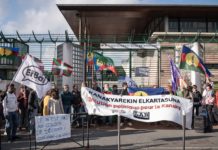The first part of the article we published, here: https://www.naziogintza.eus/en/about-the-basque-demographic-crisis-part-1/
MIGRATION FLOWS IN THE BASQUE COUNTRY
Migration flows come as no surprise in this unfair world with an ever wider social divide. Every year millions of people initiate emigration to affluent countries escaping war, famine or poverty, and this pattern is not expected to change in the short term. We cannot remain idly by this huge human tragedy, and can only show sympathy to those who knock on our door in search for a better life, just as others did when we were compelled to go abroad.
This solidarity does can not detract from the back side of the story, i.e. the impact exerted by migration flows in the host societies and their linguistic, cultural and sociological backgrounds, especially when a so-called host society like ours is a small nation, devoid of sovereignty, oppressed, rejected and speaking a minorized language. Generally speaking, we are not equipped with the resources necessary to make our language and culture accessible to immigrants, so people arriving in the Basque Country do not integrate as Basques, they integrate in Spain or France. As a result, our minorized language and native culture are subject to severe attrition.
1.- POPULATION MOVEMENTS AS EFECTIVE MEANS OF COLONIZATION
The agents of imperialism from all over the world are well aware that demographic shifts are highly effective instruments in order to bring about the assimilation and absorption of suppressed nations. They know very well that demography is a highly relevant factor in the transformation of a small nation. These agents act accordingly by prompting population shifts and resettlements with a view to crush and wipe out subdued nations.
Demography is highly instrumental in conducting colonization. Essentially, imperialists favour demographic shifts by means of colonist in order to hold sway over the subdued peoples. Colonisation represents the process by which a people imbued with imperialistic ideas takes over the material wealth of another people and strips the native people of their own language, culture and collective identity by means of alienation and estrangement. Colonisation means the subjugation of a people, imposing foreign control over them. Colonisation impregnates all levels of human activity, from society and demography to culture, economy and politics. Mass migration from the dominant nation to the subdued nation is a signature, essential feature that pervades colonisation.
Examples of demographic colonisation abound throughout history, but they stick onto the same pattern. The following list is not exhaustive, but it is illustrative enough:
1.- Attempts by the fascist leader Mussolini at italiasation in the Southern Tirol and the Valley of Aosta. Italian colonists were massively sent into these two areas with no Italian culture and language.
2.- Policies implemented by Zionism in the occupied territories of Palestine, steadily sending over Jewish settlers against the resolutions of the United Nations.
3.- The ethnocide policy implemented by China in the Tibet. Nowadays, Chinese colonists greatly outnumber native Tibetans, gradually bolstering the process of minorization of Tibetan language and culture.
4.- Population shifts encouraged by the Turks in Syrian Kurdistan since 2019.
5.- The policy implemented by Morocco over the Sahara since 1975, sending over thousands of settlers to the occupied territories. Morocco has repeatedly refused to hold a self-determination referendum in the Sahara. All the same, that does not refrain Morocco from pushing a demographic shift in the territory that guarantees a favourable result if eventually the referendum took place.
6.- The same goes for France in New Caledonia, where French colonists are expected to represent French interests in a self-determination referendum.
7.- The genocide Stalin repopulated the Baltic republics, Latvia, Lithuania and Estonia, with hundreds of thousands of Russians. Still nowadays Russians and their descendants make up for a significant wedge of the population of Estonia and Latvia, with violent linguistic feuds erupting sporadically (see this article: https://www.naziogintza.eus/en/estonia-and-ireland-two-antagonistic-linguistic-models/)
8.- The case of the Republic of Kosovo is paradigmatic: 150 years ago, the majority of its population was Serbian. However, the great migrations taking place altered the demographic balance on the ground, with the Albanians coming to constitute a majority 70 years ago, as the Serbians had a lower birth rate.
That reminds us of the demographic shift undergoing during Franco’s dictatorial regime. Not surprisingly the Peninsular Basque Country and Catalonia became the two territories receiving the highest number of Spanish immigration during Francoism. Franco was well aware of the demographic policies implemented by Mussolini. The Spanish authorities required low-cost workforce and the complicity of the Basque economic elites, with Franco’s regime fostering mass migration shifts from Castile, Galicia, Andalusia and Extremadura, especially directed at the Peninsular Basque Country and Catalonia. During that period, virtually 500.000 Spanish immigrants arrived in the western Basque territories, making up a 30% of the population.
There is no question whatsoever on the link between migration and economy. Logically and normally, migration flows head from poor countries to affluent areas. Notwithstanding this fact, the immigration phenomena during Francoism show a conspicuous political element in the Basque case. The Francoist regime was not naïf, it repeated what all imperialisms have done throughout history, i.e. spurring and encouraging a demographic shift, with a view to suppressing Basque national awareness. However, the attempt did not work exactly as expected for the regime, since a number of their children happened to embrace Basque national ideals.
2.- THE IMMIGRATION PHENOMENON IN THE BASQUE COUNTRY
The Southern Basque Country, under Spanish domination, has experienced three major migration waves in the last 150 years: firstly, at the end of the 19th century, originating essentially in Castile, landing them in Biscay. The second and most important took place during the 1960s and 1970s, spreading across all the Southern Basque Country. The last immigration wave in the early 21st century hailed especially from Africa and Southern America. To sum up, the Southern Basque Country has received hundreds of thousands of immigrants in three major waves, with most of them not integrating in the language and culture of the Basque-language areas of our People, except for certain small Basque-language towns.
Nowadays, the rate of people born outside the Basque Country is one of the highest in Europe: 29%. By contrast, the rates in Spain (13%), Germany (13%), France (12%) and Italy (10%) are far lower.
The following fact is also very revealing on the major immigration flow experienced by our nation: In the territories of Araba without the enclave of Trebiñu, Biscay and Gipuzkoa, only 35% of its population was both born in the territory and born to native parents.
Among nations in Europe, only Catalonia shows a higher immigrant percentage: 37%.
There is no society capable of hosting and integrating indefinitely such number of foreigners. The Basque Country cannot either. In the domain of language, for one, it is all too evident that language is much diminished to deal with a major migration wave. So we are dealing with a major issue. In the face of the situation, our politicians show total neglect. They turn a blind eye. Discussion on the subject is taboo, perceived as a topic that does not live up to political correctness.
We think that an unbiased study on immigration and spurring debate is a must. There is a need for a solution that rejects xenophobic positions, instead looking for an answer that does not damage either immigrants or the Basque language and culture.
In our opinion, we should start talking about “sustainable immigration” in the same way the as “sustainable development” is subject to discussion when it comes to environment. By means of this concept, we approach a migration pattern that sets the grounds for cultural and linguistic integration, as opposed to one that encourages language shift. We should indeed consider human rights and solidarity as beacons that guide us in that direction, but without completing ignoring and derailing what our People has been in the past, is presently and we expect it to be in the future.
In these late years, we bear witness to another big immigration wave completely different from the 20th century immigration. Since 2005, 400.000 new immigrants have arrived in the Basque Country, most of them hailing from Third World countries in the case of the Iberian Basque Country, namely an additional 400.000 non-Basques with no relation to Basque language tipping the scale further against our language. Our position is clear with reference to the newcomers; they are not to blame at all for the diglossic situation gone through by Basque language, but it is apparent that the drawbacks of their presence outweighs the benefits for the feeble state of our language, as they socialize in Spanish or French, not in Basque, with a few shiny exceptions.
It would not be fair to put the blame of Basque language’s diglossic state only on immigration, since Basque-speakers live among immigrants and native “Basques” who ignore Basque, with the latter arguably outnumbering immigrants. Therefore, for the state of our language, we need to transform substantially the mainstays of language policy with a view to attracting to Basque not only immigrants but native “Basques”, since it remains difficult to demand learning Basque for integration in our society when some natives do not bother to learn the language.
That said, it is apparent that our own institutions show no interest whatsoever to integrate newcomers in the Basque society. Generally speaking, they fail to lay out provisions and policies intended to revive our language, let alone instruments aiming to narrow the language gap among immigrants. We should then ask, what has the Basque Government with a seat in Vitoria-Gasteiz done to encourage Basque among immigrants arriving into our Basque-language areas? The same question is valid for the Government of Navarre or the Basque Agglomeration Community in the Continental Basque Country. Unfortunately, the answer is nothing. The Basque Government, for one, offers Spanish language lessons to the newcomers, even in the most Basque-speaking towns and villages. This is a way to send a clear message on Basque, portraying our language as fringe. If we aspire to save our language, it is fundamental to alter the way things stand now and provide courses to the newcomers with a view to integrating them in Basque and make them familiar with Basque culture. This is nothing of our invention, it is just a policy implemented in other European countries. It goes without saying, if we held full sovereignty, we would be equipped with better instruments, state-specific resources, to undertake the integration of immigrants, but until that day comes, the Basque Government and the Government of Navarre should at least secure immigration policy attributions. As long as the immigration policy remains in the hands of the Spanish Government, our authorities will always find a perfect excuse to do nothing in this respect.
It is worth noting that individual immigration usually guarantees an integration in the host society, but it does not when immigration happens in the context of a large wave of people, since immigrants prioritize relationships within their group. Therefore, they are prone to form close communities, as we have often witnessed in our towns. There is only one way forward to avoid that: undertaking immigrant integration into the Basque society.
3.- SITUATION IN THE CONTINENTAL BASQUE COUNTRY
This report on Basque demography could not ignore a mention to the situation in the Continental Basque Country, since the Basque Country under French rule is also subject to a major demographic issue. The rationale behind this problem is not, unlike the Iberian Basque Country, the low birth rate, given the fact that the territory has seen the implementation of effective birth raising policies, just the same as everywhere in France. By contrast, problems arise when every year 4.000 newcomers arrive to a territory with an approximate population of 300.000. However, the profile of these newcomers differs widely from that in the Iberian Basque Country; they are not people arriving from the Third World, but French pensioners characterized by a high purchasing power. In addition to the retired, the Continental Basque Country attracts a significant number of French young couples.
This situation is further worsened by the sheer number of youngsters moving out to French cities to continue their education or in search of better professional prospects. It remains a structural problem. On the one hand, it does not exist a large city acting as a pole of attraction; on the other hand, an economy based on tourism does not cater for the professional expectations of the natives. A change in the production model seems urgent, since the dominant tourism sector, besides encouraging a rise in housing prices, does not cater for the aspirations of the youth in Lapurdi, Lower Navarre and Zuberoa. It is necessary the establishment of policies aimed at industrial development in order to reduce tourism dependency and offer quality job positions to the native youngsters. Economic agents from the Continental Basque Country had better improve their relations with the economic network of the Iberian Basque Country and pave the grounds for a common and mutually beneficial project.
While the exodus of the youth continues, ever more French pensioners settle down in the Continental Basque Country for a golden retirement. According to the data provided by Basque statistics agency GAINDEGIA, the population rate in Lapurdi rose by 18% in the period extending from 2000 to 2007: 40.000 new inhabitants, French for the most part. The total population in 1999 was 262.370 in the Continental Basque Country, rising to 302.980 in 2015. Needless to say, the vast majority of that demographic figure is completely alien to Basque language and culture, leading their lives totally unconnected to them. Noticeably, in 2016 53% of the population in the Continental Basque Country was born outside its boundaries.
Reporter Eneko Gorri from the weekly magazine ARGIA sheds some light on the dimensions of the issue (ARGIA, No 2.577):
“What people, Basque-language supporters, do not quite assimilate is that other public policies developed in public administration have farther-reaching consequences than language policies. For example, I am persuaded that if Biarritz multiplied tenfold the budget destined to Basque and it enlarged its staff by hiring another twenty workers that would not make a big difference when it comes to the state of Basque for the next 50 or even 100 years. Why? Well, urbanism patterns, tourism patterns, housing policies, will still be far more powerful than language policies. Urbanism is never mentioned in this respect, but it is necessary a thought on that (linguistic) aspect”.
The dominance of the tourism sector has wreaked havoc in the cultural and linguistic scene of the Continental Basque Country. If the trend continues, all Basque-specific signs of identity will just vanish there. The Iberian Basque Country has something to learn from that damaging experience to avoid incurring the same errors; the Iberian Basque Country will sustain the same damage if the tourism industry is not reined in.
4.- TOWARDS AN OPEN BASQUENESS
We should make it clear that we advocate for an open and inclusive concept of the Basque nation. It is up to the people arriving into the Basque Country in quest for a better life to decide whether they wish to be Basques or Basque-speakers among us or they intend to remain immigrants forever. That decision making comes down to them, not us. That means that s/he who decides to be a Basque-speaker, no matter where s/he originates from, their surname, ideology or skin colour, s/he will be regarded as a Basque-speaker by us. Basque is the most adequate instrument to integrate immigrants in our People, there is hardly any place as open minded as this when it comes to their consideration as fellow citizens. Our approach runs essentially along the lines of national criteria, not ethnic criteria.
The same applies with reference to becoming a Basque citizen, regardless of legal considerations. We cannot agree with that confusing motto that goes “a Basque is someone who lives and works in the Basque Country”. By the same token, the general Galindo, a Spanish torturer, and all the Civil Guard staff living in the headquarters of Intxaurrondo would be Basques, just nonsense. Our take is that a Basque is someone who besides living in the Basque Country, feels also as a Basque, since the wish to be a Basque is a condition to become a Basque, no matter what the origin is.
However, those arriving in the Basque Country might as well consider another option, i.e. refusing to become a Basque-speaker or a Basque altogether, by living as if they were in their own country, and not integrating into our society. That option exists and is to be respected, but they should face up to the consequences: in that case, the decision to remain forever foreigners in our nation comes down to them, not to us.
OUR PROPOSALS:
1.- The Iberian Basque Country may opt for two solutions in the face of the demographic crisis: either increase its birth rate or call further immigrants in. At this moment, our institutions have been inclined for the latter. Without rejecting the immigration option in the short term, we prioritize the birth rate increase solution.
2.- It is completely necessary for the public institutions of the Southern Basque Country to commit to birth rate rising policies. The Basque Government and the Government of Navarre should establish a Demography Department in order to encourage a rise in birth rates. Nowadays, the Basque Govt is engaged in a number of campaigns, none of which supports an increase in birth rate. In Europe, these policies have long existed across a number of states, developing them to great success, closest to us, the French state. We should learn from them.
3.- An important part of public expenditure should be channelled to allowances for parenting. Along the same lines, social benefits are a must: community housing for the youth, decent wages, incentives and tax relief for parenting, bold conciliation policies, extension of parenting allowances, free kindergartens, bonuses for parenting leaves, etc.
4.- A change in the demographic problem of the Continental Basque Country requires a modification of the production model based on tourism, as well as closer economic ties with the rest of the Basque Country.
5.- Just as the concept of “sustainable development” is used in order to protect environment and ecosystems, “sustainable immigration” should also become useful in order to provide shelter to minorized languages and cultures. Immigration policies should consider linguistic and cultural impact in the same way as the environmental impact does.
6.- We stand for both the right of migrants to improve their livelihood, as well as the respect due to the language, culture and identity of the Basque Country. We need to strike a balance between both aspects, rejecting xenophobic attitudes.
7.- All immigrants should receive a Reception Course for Cohabitation, emphasizing the importance of Basque language and culture, especially in Basque-language areas. They should likewise develop and train their aptitudes in Basque.
8.- People of Basque origin in the Diaspora should hold a priority, providing bonuses in order for them to come to us.
9.- In this respect, all youth expats with higher education and job positions moving abroad during the crisis period should receive special attention. They should receive incentives and support to allow for their way back to the Basque Country.
10.- Dissemination of the message advocating for open Basqueness. A genuine Basque lives in Basque, no matter where they come from, their surnames or skin colour. We need to proclaim that Basque is the most effective instrument for integration.








